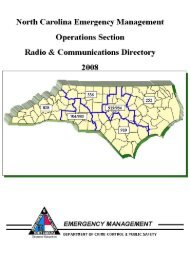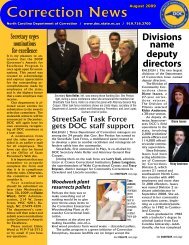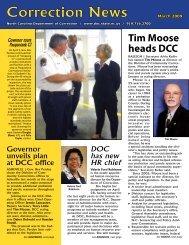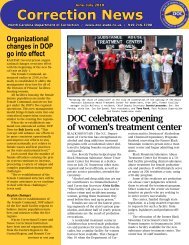Scene
October - North Carolina Department of Public Safety
October - North Carolina Department of Public Safety
You also want an ePaper? Increase the reach of your titles
YUMPU automatically turns print PDFs into web optimized ePapers that Google loves.
Page 23 On the <strong>Scene</strong> October 2013<br />
N.C. National Guard Special Projects Team<br />
saves money, improves training, readiness<br />
By Sgt. 1st Class Robert Jordan<br />
RALEIGH | Army Staff Sgt. Jimmy Peacock cradled<br />
the gun carefully and drew a bead on his target.<br />
Kneeling, he leaned forward, aimed and squeezed the<br />
trigger. His weapon? A caulk gun. His target? Waste.<br />
A team of eight soldiers, four engineers and four<br />
environmental experts used their training and experience<br />
to bring a little self-help renovation to 15 armories<br />
across the state. The assignments are part of<br />
the North Carolina National Guard’s Special Projects<br />
Team efforts to save money statewide.<br />
These armories have extensive areas available for<br />
training and storage of mission equipment but after<br />
years of use, they did not meet current environmental<br />
standards and could not be used.<br />
The estimates to remove lead and other contaminants<br />
and to renovate could cost nearly $300,000,<br />
a prohibitive cost in a time of tight budgets. Guard<br />
logistics leaders with the SPT tasked to find a better<br />
and cheaper solution use their<br />
own experts.<br />
“We identified the soldiers<br />
and the game was on,” said<br />
Army 1st Sgt. Matthew Mc-<br />
Diarmid with Headquarters<br />
Company, 30th Brigade Special<br />
Troops Battalion and a SPT<br />
leader with the NCNG logistics<br />
office.<br />
Orders were issued to the<br />
soldiers who combined practical<br />
construction skills with<br />
advanced scientific knowledge<br />
and technique. The plan was<br />
simple: Use their annual training<br />
budget and equipment to remove<br />
the hazardous chemicals<br />
A North Carolina<br />
and renovate the armories.<br />
National Guard Soldier<br />
“The soldiers [who decontaminate]<br />
are already trained<br />
uses a saw to cut<br />
metal studs to length<br />
to work with and protect themselves<br />
from contaminates that<br />
during a large scale<br />
wall locker project at<br />
are not visible to the naked<br />
the Reidsville Army<br />
eye,” McDiarmid said.<br />
Readiness Center. Photo<br />
The soldiers must practice<br />
by Army 1st Sgt. Matthew<br />
every year to keep their skills<br />
McDiarmid, 30th Special<br />
Troops Battalion. See Projects on page 21<br />
Duke Energy officials present check to NCDPS<br />
Duke Energy officials visited Central Prison on Sept. 17 to present a check for approximately $139,000 as payment for Central<br />
Prison’s participation in the Duke Energy Demand Response Automation program. During peak summer demand periods,<br />
customers who elect to participate in the program agree to curtail usage until demand decreases. Shifting peak customer demand<br />
can help to delay the need to build new power plants. When activated, the program requires the Central Prison complex to<br />
curtail its usage of power from the electric grid for non-essential systems and operate under its own generator power. Holding<br />
the simulated check are David Guice, left, commissioner of the Division of Adult Correction and Juvenile Justice (ACJJ); and<br />
Frank Perry, secretary of the Department of Public Safety. Others in the photo are, from left, Kenneth Lassiter, Adult Facilities<br />
Central Region director; Joe Prater, deputy commissioner for ACJJ administration: Tim Moose, deputy commissioner for<br />
ACJJ operations; JR Gorham, ACJJ executive officer; Douglas Biggs, HVAC supervisor I; William Ragland, HVAC mechanic;<br />
Justin Woodring, HVAC mechanic; Carlton Joyner, Central Prison warden; Robert Adams, HVAC mechanic; Larry Wann,<br />
engineer; George Solomon, director of Prisons; Bill Stovall, ACJJ Central Engineering director; and John Majernik, energy<br />
manager in ACJJ Central Engineering. (Contributed photo.)<br />
9 correctional nurses pass national certification exam<br />
Nine correctional nurses recently passed the<br />
national exam, making them Certified Correctional<br />
Healthcare Professionals (CCHP).<br />
The exam is offered through the National Commission<br />
on Correctional Healthcare (NCCHC) organization<br />
to qualified professionals working in jails,<br />
prisons and detention centers. Certification status<br />
recognizes the mastering of national standards by<br />
dedicated Department of Public Safety nurses, whose<br />
chosen profession is to provide quality medical services<br />
to the population they serve.<br />
The nurses are Ellen Wiley and David Wolfe,<br />
both registered nurses (RN) at Mountain View Correctional<br />
Institution; Theresa Gore, RN at Tabor CI;<br />
Arnette Tineo, Enice Onoh and Steve Wales, RNs<br />
at Central Prison; Cheryl Berryhill, licensed practical<br />
nurse at Central Prison; Latasha Horton, RN at<br />
Wake Correctional Center; and Stephanie Leach, RN<br />
in Prisons Administration at the Randall Building in<br />
Raleigh.















